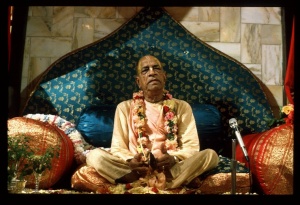SB 10.38.27: Difference between revisions
m (1 revision(s)) |
(Vanibot #0054 edit - transform synonyms into clickable links, which search similar occurrences) |
||
| (One intermediate revision by one other user not shown) | |||
| Line 1: | Line 1: | ||
{{info | {{info | ||
|speaker= | |speaker=Śukadeva Gosvāmī | ||
|listener=King | |listener=King Parīkṣit | ||
}} | }} | ||
[[Category:Srimad-Bhagavatam - Canto 10 Chapter 38]] | |||
[[Category:Bhagavatam Verses Spoken by Sukadeva Gosvami - Vanisource|103827]] | |||
<div style="float:left">'''[[Srimad-Bhagavatam]] - [[SB 10|Tenth Canto]] - [[SB 10.38: Akrura's Arrival in Vrndavana|Chapter 38: Akrūra's Arrival in Vṛndāvana]]'''</div> | |||
<div style="float:right">[[File:Go-previous.png|link=SB 10.38.26]] '''[[SB 10.38.26]] - [[SB 10.38.28-33]]''' [[File:Go-next.png|link=SB 10.38.28-33]]</div> | |||
{{RandomImage}} | |||
{{SBnotice}} | |||
==== TEXT 27 ==== | ==== TEXT 27 ==== | ||
<div | <div class="verse"> | ||
dehaṁ-bhṛtām iyān artho | :dehaṁ-bhṛtām iyān artho | ||
hitvā dambhaṁ bhiyaṁ śucam | :hitvā dambhaṁ bhiyaṁ śucam | ||
sandeśād yo harer liṅga- | :sandeśād yo harer liṅga- | ||
darśana-śravaṇādibhiḥ | :darśana-śravaṇādibhiḥ | ||
</div> | </div> | ||
| Line 17: | Line 22: | ||
==== SYNONYMS ==== | ==== SYNONYMS ==== | ||
<div | <div class="synonyms"> | ||
deham- | ''[//vanipedia.org/wiki/Special:VaniSearch?s=deham&tab=syno_o&ds=1 deham]-[//vanipedia.org/wiki/Special:VaniSearch?s=bhṛtām&tab=syno_o&ds=1 bhṛtām]'' — of embodied beings; ''[//vanipedia.org/wiki/Special:VaniSearch?s=iyān&tab=syno_o&ds=1 iyān]'' — this much; ''[//vanipedia.org/wiki/Special:VaniSearch?s=arthaḥ&tab=syno_o&ds=1 arthaḥ]'' — the goal of life; ''[//vanipedia.org/wiki/Special:VaniSearch?s=hitvā&tab=syno_o&ds=1 hitvā]'' — giving up; ''[//vanipedia.org/wiki/Special:VaniSearch?s=dambham&tab=syno_o&ds=1 dambham]'' — pride; ''[//vanipedia.org/wiki/Special:VaniSearch?s=bhiyam&tab=syno_o&ds=1 bhiyam]'' — fear; ''[//vanipedia.org/wiki/Special:VaniSearch?s=śucam&tab=syno_o&ds=1 śucam]'' — and sorrow; ''[//vanipedia.org/wiki/Special:VaniSearch?s=sandeśāt&tab=syno_o&ds=1 sandeśāt]'' — beginning from his being ordered (by Kaṁsa); ''[//vanipedia.org/wiki/Special:VaniSearch?s=yaḥ&tab=syno_o&ds=1 yaḥ]'' — which; ''[//vanipedia.org/wiki/Special:VaniSearch?s=hareḥ&tab=syno_o&ds=1 hareḥ]'' — of Lord Kṛṣṇa; ''[//vanipedia.org/wiki/Special:VaniSearch?s=liṅga&tab=syno_o&ds=1 liṅga]'' — the signs; ''[//vanipedia.org/wiki/Special:VaniSearch?s=darśana&tab=syno_o&ds=1 darśana]'' — with the seeing; ''[//vanipedia.org/wiki/Special:VaniSearch?s=śravaṇa&tab=syno_o&ds=1 śravaṇa]'' — hearing about; ''[//vanipedia.org/wiki/Special:VaniSearch?s=ādibhiḥ&tab=syno_o&ds=1 ādibhiḥ]'' — and so on. | ||
</div> | </div> | ||
{{SBcollapse}} | |||
==== TRANSLATION ==== | ==== TRANSLATION ==== | ||
<div | <div class="translation"> | ||
The very goal of life for all embodied beings is this ecstasy, which Akrūra experienced when, upon receiving Kaṁsa's order, he put aside all pride, fear and lamentation and absorbed himself in seeing, hearing and describing the things that reminded him of Lord Kṛṣṇa. | The very goal of life for all embodied beings is this ecstasy, which Akrūra experienced when, upon receiving Kaṁsa's order, he put aside all pride, fear and lamentation and absorbed himself in seeing, hearing and describing the things that reminded him of Lord Kṛṣṇa. | ||
</div> | </div> | ||
| Line 31: | Line 36: | ||
==== PURPORT ==== | ==== PURPORT ==== | ||
<div | <div class="purport"> | ||
Śrīla Viśvanātha Cakravartī explains that Akrūra gave up fear by openly showing his love and reverence for Kṛṣṇa, even though he or his family might have been punished by the angry Kaṁsa. Akrūra gave up his pride in being an aristocratic member of society and worshiped the cowherd residents of the simple village of Vṛndāvana. And he gave up lamenting for his house, wife and family, which were in danger from King Kaṁsa. Giving up all these things, he rolled in the dust of the lotus feet of God. | Śrīla Viśvanātha Cakravartī explains that Akrūra gave up fear by openly showing his love and reverence for Kṛṣṇa, even though he or his family might have been punished by the angry Kaṁsa. Akrūra gave up his pride in being an aristocratic member of society and worshiped the cowherd residents of the simple village of Vṛndāvana. And he gave up lamenting for his house, wife and family, which were in danger from King Kaṁsa. Giving up all these things, he rolled in the dust of the lotus feet of God. | ||
</div> | </div> | ||
__NOTOC__ | </div> | ||
</div> | |||
<div style="float:right">[[File:Go-previous.png|link=SB 10.38.26]] '''[[SB 10.38.26]] - [[SB 10.38.28-33]]''' [[File:Go-next.png|link=SB 10.38.28-33]]</div> | |||
__NOTOC__ | |||
__NOEDITSECTION__ | |||
Latest revision as of 18:55, 17 February 2024

A.C. Bhaktivedanta Swami Prabhupada
Please note: The synonyms, translation and purport of this verse were composed by disciples of Śrīla Prabhupāda
TEXT 27
- dehaṁ-bhṛtām iyān artho
- hitvā dambhaṁ bhiyaṁ śucam
- sandeśād yo harer liṅga-
- darśana-śravaṇādibhiḥ
SYNONYMS
deham-bhṛtām — of embodied beings; iyān — this much; arthaḥ — the goal of life; hitvā — giving up; dambham — pride; bhiyam — fear; śucam — and sorrow; sandeśāt — beginning from his being ordered (by Kaṁsa); yaḥ — which; hareḥ — of Lord Kṛṣṇa; liṅga — the signs; darśana — with the seeing; śravaṇa — hearing about; ādibhiḥ — and so on.
Translation and purport composed by disciples of Śrīla Prabhupāda
TRANSLATION
The very goal of life for all embodied beings is this ecstasy, which Akrūra experienced when, upon receiving Kaṁsa's order, he put aside all pride, fear and lamentation and absorbed himself in seeing, hearing and describing the things that reminded him of Lord Kṛṣṇa.
PURPORT
Śrīla Viśvanātha Cakravartī explains that Akrūra gave up fear by openly showing his love and reverence for Kṛṣṇa, even though he or his family might have been punished by the angry Kaṁsa. Akrūra gave up his pride in being an aristocratic member of society and worshiped the cowherd residents of the simple village of Vṛndāvana. And he gave up lamenting for his house, wife and family, which were in danger from King Kaṁsa. Giving up all these things, he rolled in the dust of the lotus feet of God.